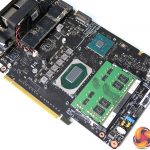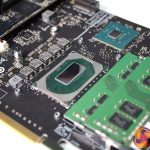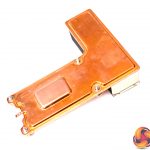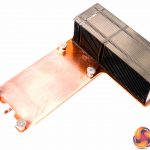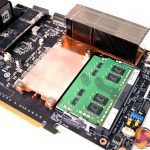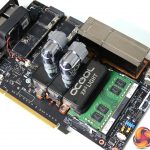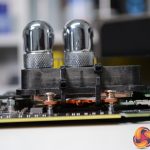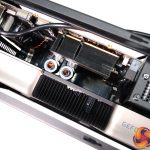In the second part of our Intel NUC 9 Extreme water cooling project, we run through our ideas and detail how the custom water cooling solution for the Compute Element card will be designed and made. A CAD drawing of a copper heat spreader will be needed for manufacturing, so I contact KitGuru's resident engineer, Luke Hill, to help out before mocking up the design using the stock heatsink with some Alphacool CPU water blocks.
We have a few ideas about how to approach the custom water block for the NUC 9 Extreme Compute Element. Due to the lack of useable space on the board around the CPU, we are rather limited in what we can do. Our initial idea is to make a copper heat spreader, similar to what you would find integrated into a desktop CPU. The stock heatsink uses a large copper base plate with a combined vapour chamber and an aluminium fin stack heatsink cooled by a small fan.
The plan is to replicate part of the stock heatsink, mainly the baseplate but using a solid copper heat spreader design rather than a vapour chamber, retain the stock mounting solution and backplate while shortening the copper base plate to cover the CPU and VRM only. The chipset will be passively cooled using an aluminium heatsink and an off the shelf Alphacool CPU block will be mounted directly to our custom copper heat spreader.
For this, we will need the copper heat spreader manufactured by CNC machining, most likely a milling machine, so Luke pops in virtually to discuss whether the idea will work and to help out with the CAD drawing that will be needed to get our custom heat spreader and custom water block upper mounting bracket manufactured.
Both Luke and myself agree that the copper heat spreader idea should work in principle but we have a backup option in case it isn't successful, in the form of some small water blocks from Koolance. These blocks should allow us to perform direct die cooling, however, these blocks are not easy to obtain in the UK, shipping costs are high and could potentially take a while to reach us and, of course, it would be cool to manufacture a solution of our own even if it does not work as hoped.
With all this in mind, now is a good time to test whether our custom copper CPU heat spreader will work in the real world, so I proceed to mock up the installation using the stock heatsink, an Alphacool NexXxos XP3 Light CPU block, zip ties and some creativity. Desoldering the copper VRM heatsink extension was necessary and with a layer of thermal compound applied to the mating surface, the Alphacool block fits in position. With two angled fittings installed there is about 1mm clearance between the fittings and the back of the RTX 3080 graphics card which is tight but means that our solution will physically fit.
In the next video, we will take a look at fitting the water block to the graphics card, figure out where to mount the pump/res and decide on the radiator size, placement and work out how to route the tubing inside this tiny chassis. Case mods will be required to fit all the water cooling hardware, we will look at this in more detail during future videos, as well as adding some custom side panel designs, acrylic and our own lighting.
Find out more here:
INTEL INNOVATION: intel.com/innovation
VISIT INTEL: https://www.youtube.com/channel/UCk7SjrXVXAj8m8BLgzh6dGA
VISIT INTEL TECHNOLOGY: https://www.youtube.com/channel/UC_9tBCeHdBG13If451X7FRw
GHOST CANYON: https://simplynuc.co.uk/ghost-canyon/
SCAN: https://www.scan.co.uk/shops/intel/ghost-canyon-nuc
EBUYER: https://www.ebuyer.com/store/Components/cat/Barebones/Intel
KitGuru says: The layout of the water cooling will start to become clear in upcoming videos so, if this is something you are interested in make sure you stay tuned to our YouTube channel for upcoming videos. You won't want to miss seeing how this ultra small form factor water cooling project turns out!
 KitGuru KitGuru.net – Tech News | Hardware News | Hardware Reviews | IOS | Mobile | Gaming | Graphics Cards
KitGuru KitGuru.net – Tech News | Hardware News | Hardware Reviews | IOS | Mobile | Gaming | Graphics Cards


